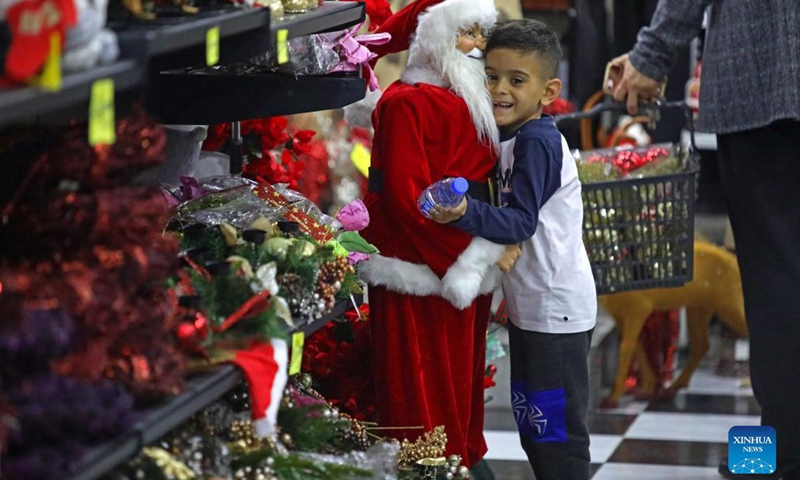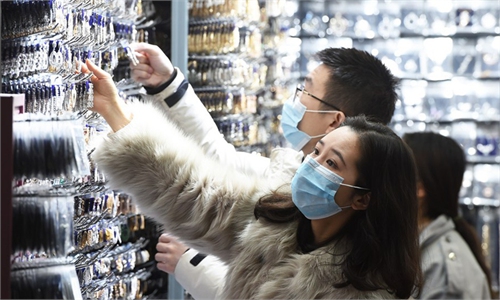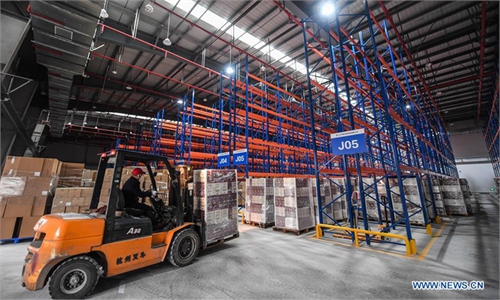
A boy is seen with a Santa figure at a store selling Christmas decorations in Beirut, Lebanon, on Dec. 11, 2021.Photo:Xinhua
Though the usual peak season for Christmas exports for merchants in Yiwu, one of the world's largest small commodity trading hubs in East China's Zhejiang Province, should be over a couple months ago, many firms are still making final efforts to shipping out last orders via expensive air transport just ten days before the holiday.
The busy scene underscored robust demand for everything from Christmas trees to decorating lights to gifts from Yiwu as well as lingering logistics disruptions posed by the COVID-19 pandemic. New COVID-19 cases in the province over the past several days also had impact on truck drivers and road transport, merchants and industry insiders told the Global Times on Tuesday, adding that despite the challenges, Yiwu has ensured relatively steady supply for the most important holiday in many Western countries.
"I don't think the epidemic has affected air logistics. The logistics segment from the customer to the plane did experience some impact, mainly on drivers, who are required to take nucleic acid tests. But overall transport operations are normal," Wang Dongxiao, manager of air transport at Ningbo Jiawei International Freight Forwarding Co, told the Global Times on Tuesday.
Zhu Qiucheng, CEO of Ningbo New Oriental Electric Industrial Development, told the Global Times that the outbreak and its impact are controllable. "But some enterprises may be affected, as their upstream enterprises may have suspended production due to epidemic controls," Zhu noted.
Manufacturers from Yiwu said that drivers need to provide 48-hour nucleic acid tests, so fewer drivers are willing to come. Despite the flare-ups, logistics agents and manufacturers said that some Christmas product companies are making a final effort to export, even with only 10 days left.
"Air shipping is fully booked until after the 25th, which means some products for Christmas will arrive in the US after the festival," said Wang, adding that it takes one day for direct flights from China to the US, while transfer flights need three to five days. "Christmas products shipped by air this year were mainly ornaments. The shipping rate is 80 yuan ($12.57) per kilogram."
Bulk exports of Christmas products ended at the end of August, and the recent air exports are merely a small part of the total, Cai Qinliang, secretary-general of the Industry Association of Christmas Supplies in Yiwu, told the Global Times on Tuesday.
According to industry practitioners, the export season for Christmas usually lasts until October.
"Behind the early arrival of the export season is the global shipping capacity crunch. But Yiwu's overall Christmas product exports in 2021 have recovered to 70-80 percent of pre-pandemic levels," said Cai.
According to reports, the Yiwu International Trade City has hundreds of Christmas goods merchants, and two-thirds of the world's Christmas goods come from the facility.
"The domestic production cycle is basically the same as before the epidemic. For example, the production cycle for Christmas trees is 15-30 days. But transport is difficult. There are long waiting times for containers and ships," Cai said, noting that hikes in raw material prices and labor costs have prompted manufacturers to produce less.
Skyrocketing shipping rates have led importers to reduce their orders, Chinese exporters said.
Retailers all over the world have reported price hikes for Christmas products, coming from lower supplies and snarls in logistics.
For instance, artificial Christmas tree retailers have reported having to hike prices by 20-30 percent this season, according to the American Christmas Tree Association (ACTA).
A foreign trade enterprise based in Yiwu, with annual export revenues of about 150 million yuan, said that due to soaring prices and congestion of international logistics, millions of Christmas trees cannot leave in time for overseas.
The company had to spend 2 million yuan to rent a 10,000-square-meter warehouse for stacking Christmas trees.
About 85 percent of the artificial Christmas trees imported by the US come from China, according to the US Commerce Department. Approximately 94 million homes will display Christmas trees in 2021. Of those trees, 85 percent will be artificial, and 15 percent will be live, according to a survey by the ACTA. That means about 68 million of the artificial trees the US needs will come from China in 2021.
The current surge in container freight rates, if sustained, could increase global import price levels by 11 percent and consumer price levels by 1.5 percent between now and 2023, according to a report UNCTAD published on November 18.
Some Yiwu exporters have told their buyers to make orders for 2022 starting now and as early as possible so that exporters can book containers and ships in advance.
"Prices for Christmas products can go even higher next year than in 2021, if the costs of freight continue to rise," a manufacturer and exporter of porcelain decorations for Christmas at the Yiwu International Trade City, told the Global Times.



